The state of the art in futures studies, is a compilation and complementation elaborated by Lucio Mauricio Henao Vélez from his experience, secondary information investigated in other websites of prospective, future studies, future research. foresight, prospective and other sources. El estado del arte en estudios de futuros, es una recopilación y complementación elaborada por Lucio Mauricio Henao Vélez desde su experiencia, información secundaria indagada en otros sitios web de prospective, future studies, future research. foresight, prospectiva y otras fuentes. |
-
Diplomados y otros / Diplome and others
-
Programas globales y recursos para estudiantes / Global programs and resources for students
-
Cursos - Seminarios / Courses - Seminars
| Institución - Institution | Título - Titre - Title | Resumen - Résumé - Summary | Idioma - Langue - Language |
||||||||||||||||||||||||||||||||||||||||||||||||||||||||||||||||||||||||||||||||||||||||||||||||||||||||||||||||||||||||||||||
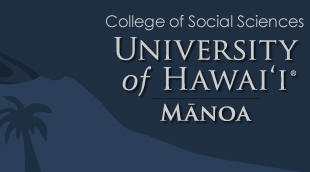
University of Hawai Manoa |
Alternative Futures M.A |
The University Hawaii Political Science Department has offered undergraduate and graduate courses in political futures studies since 1969. In 1978, the *Alternative Futures M.A. Option* was created in order to offer an advanced degree for people who wish to engage in futures research professionally from a political science perspective. Undergraduate work in futures studies may be undertaken within the Department of Political Science, while an undergraduate major in futures studies can be personally tailored through the UH Liberal Studies Program. A freshman-level introduction to political futures studies, Political Science 171, is taught both online and in classrooms. It is available to any qualified person, worldwide, as an entirely *web-based course* or as a classroom course for undergraduate students enrolled not only at the University of Hawaii at Manoa but also at many of the other campuses of the University of Hawaii system. There is also an advanced undergraduate course, Political Science 342, Futuristics and Political Design, which is presently only available as a classroom course at the Manoa campus. It focuses on various political designs for a future settlement on Mars. The Alternative Futures M.A. Option within the Department of Political Science of the University of Hawaii normally takes two to three academic years. One or more years are devoted to course work, including two required futures core courses (Polsci 672 and Polsci 673), three (out of eight) core political science courses (Polsci 610-680), two courses in research methods (Polsci 601 and Communications 696), and three electives, one of which must be a 700-level seminar. The final year entails a paid internship where the student applies futures theories and methods to planning and policy making in an organization providing an intern position. Most interns have worked in the Institute for Alternative Futures in Alexandria, Virginia. The Center has had an ongoing relation with the Institute since helping establish it in 1976. Internships (sometimes paid and sometimes not) in other public or private organizations are also tailored to the needs and preferences of each member of the Option. Students preferring not to intern may choose to write a future-oriented MA thesis instead. |
|||||||||||||||||||||||||||||||||||||||||||||||||||||||||||||||||||||||||||||||||||||||||||||||||||||||||||||||||||||||||||||||
|
Technical University of Ingolstadt Germany |
Master program "Global Foresight and Technology Management (M. Sc.) |
1. Semestre
Prospectiva estratégica y análisis de tendencias
Métodos de gestión de la innovación
Diseño y evaluación de tecnología
Proyecto Future Life Worlds
Aplicación de tecnología de proyectos
2. Semestre
Modelado de negocios futuros
Procesos de transformación y gestión del cambio
Evaluación tecnológica y ética empresarial
Escenarios comerciales del proyecto y gestión de riesgos
Seminario de investigación de proyectos
3. Semestre
Tesis de maestría
|
|||||||||||||||||||||||||||||||||||||||||||||||||||||||||||||||||||||||||||||||||||||||||||||||||||||||||||||||||||||||||||||||
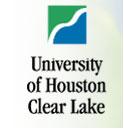
University of Huston USA |
Studies of the Future MS |
The graduate program in Studies of the Future leads to the master of science (MS) degree. The plan is by nature multidisciplinary, leading to foresight about emerging patterns, trends, cross-impacts, and implications involving demographic, social, technological, economic, ecological, political and related topic areas. Many graduates do forecasting, strategic planning, anticipatory impact assessment or issues management in business, government or non-profit organizations. Other alumni seek the Ph.D. degree in specializations of their choosing. Still others take the MS degree in Studies of the Future for more general reasons, finding it a stimulating way to enlarge their personal and professional horizons. As an alternative to the MS in Studies of the Future, students may complete a 12-hour sub-plan in Studies of the Future within the Master of Business Administration degree (MBA). For a description of this sub-plan see the School of Business section in the catalog. |
|||||||||||||||||||||||||||||||||||||||||||||||||||||||||||||||||||||||||||||||||||||||||||||||||||||||||||||||||||||||||||||||

Finlandia |
Master’s Degree Programme in Futures Studies
Doctor of Philosophy - Futures Studies as a Major |
The Master’s Degree Programme in Futures Studies is designed to educate foresight experts who help organisations to harness future opportunities and avoid unnecessary risks. The programme trains students to become professionals who are competent to choose from various methods when facing a particular development challenge. The students will get a versatile toolkit to implement foresight thinking for the benefit of a given organisation.
The two-year Master’s Degree Programme in Futures Studies is composed of 120 credits (ECTS). The final degree conferred is Master of Arts. Students should note that this is a full-time programme and physical attendance will be required by most courses.
In the postgraduate studies the doctoral candidates will deepen their understanding and skills in Futures Studies in order to be able to act as independent researchers in the field of Futures Studies. At the TSE, a wide range of research topics have been carried out in the field of Futures Studies. Students can specialize in, for example, business foresight, the future of energy and environmental issues, education, large scale socio-economic transitions, future consciousness and futures studies methodology.
These experts will be employed in demanding research, education, development, and foresight duties in companies and public organizations. The first intake of PhD students will be in November 2013 and from the year 2014 onwards twice a year (May and November). |
|||||||||||||||||||||||||||||||||||||||||||||||||||||||||||||||||||||||||||||||||||||||||||||||||||||||||||||||||||||||||||||||

Greeleaf University USA |
Master Level Courses
|
Future Studies (FS) FS 500 Personal and Professional Growth Plan The Personal and Professional Growth Plan (PPGP) is addressed in detail in a separate publication. The PPGP is an initial assessment assisting the learner in the development of an individualized study program. It provides the learner with a unique perspective of past experience, present goals, and future professional growth potential, as well as a first draft of a realistic study program and time line leading to degree completion. FS501 Leadership and Management A presentation of the future roles and relationships between leaders, managers, and workers in both the public and private sectors, nationally and globally; examination of the relationships between authentic leadership and creative management including the challenge of followership and what leadership is about; tools of the leader; servant-leadership. FS502 The Literature of Futurology A discussion of the "history of the future" and the rich heritage of literature dealing with the future, prior to the creation of modern futurology; the origins of futurology, its evolution, and current issues. FS503 Futures Research Methodologies An examination of the numerous futures research methodologies, and their uses. An exploration of the principal forecasting and trending instruments used to establish the parameters and simulations of future events and behaviors, the use of risk analysis and risk assessment to estimate impacts, and the capacity of Delphi and scenarios to simulate and evaluate future events. An examination of the historical development of current globalization; a description and analysis of demographics, economics, and diversity of the global economy and competition; the commitment of multinationals to world quality standards such as ISO 9000; and the prospects in the future for international trade, global integration, and joint venture. FS512 The Challenges of Technology An examination of the role of technology as a driving force of social change, and the major technological breakthroughs that are likely to occur in the next 25 years; the phenomenon of social change; an estimate of the various orders of impacts such technologies will have on world commerce and productivity; the use of technology assessment as a form of technology risk analysis. FS513 The Future of Organizations An examination of the major international agencies, their structural configurations, and their roles in promoting international stability and national integrity; discussion of the likely evolution of organizations in the future and the impact of multinational organizations, international organizations and trends in organizational development and behavior. FS514 The Future of Social Systems A discussion of the nature of classic, current, and future theories of systems and their capacity to explain and to some extent predict the behaviors of large scale organizations; the possible scenarios for social evolution beyond the decline of the welfare state and the changes in the nation-state; the emergence of the "third sector;" the decline of government power; the increasing obsolescence of politics and future of capitalism. FS515 Systems Thinking: Theory & Practice An examination of the basic theories of systems thinking and the uses of systems theory in practice, particularly in multi-disciplinary studies and complex situations and problems. FS516 Communications & Information Systems An examination of the revolution in contemporary communications; an analysis of the art and science of knowledge management, the current and future state of information systems, the use of distance learning and training via internet and satellite; and the long range projections of the future of the World Wide Web. FS517 Sustainable Development: Illusion or Reality An examination of the global environment and of environmental organizations and groups; the linkage between environmental, protection, and sustainable economic development; the limits to growth; global simulation; the prospect for environmental stability in the 21st century. The selection of a topic; working to complete the research and to write up an acceptable purpose methodology, results and conclusions; producing a satisfactory paper or project report |
|||||||||||||||||||||||||||||||||||||||||||||||||||||||||||||||||||||||||||||||||||||||||||||||||||||||||||||||||||||||||||||||

Leeds Metropolitan University UK |
M.A. in Foresight and Futures Studies |
It has become increasingly clear that human decisions and actions play an important part in determining the future of both humanity and the world in which we live. At the start of the 21st century we are faced with a range of questions in economic, social, political and technological fields which could have major significance for the future. Many of these questions raise important ethical issues. They are also frequently surrounded by uncertainty. To make effective decisions we would need knowledge of the future impact of alternative courses of action that we cannot possess. We are consequently forced to make decisions, which have long term implications in conditions of considerable uncertainty. Foresight and Futures Studies, a developing international discipline, aims to critically examine the difficulties associated with making decisions with long term future consequences in conditions of uncertainty and to provide methods through which these difficulties can be minimised and a creative approach to the future adopted. Among the questions facing humanity is the growing awareness of our dependence on the fragile earth and the impact of human activity over the last 200 years on it. We are faced with the possibility that our species could be working towards its own destruction. We cannot be certain, until it is too late, but the awareness of the possibility creates a novel circumstance. If, for example, we are the first generation that influences global climate, and the last generation to escape the consequences, we have moved into a new era in which we are responsible as never before for what happens in the future. To an extent, we have had this responsibility since humanity first planted crops, started making tools and began to use fire, but ours is the first generation to become aware of our impact and, consequently, to understand the nature of our responsibility. Previous generations have been able to live without this knowledge, to act in their present assuming that the future would look after itself. We do not have that privilege. Our technology, which if anything, is the cause of the problem, has also given us the ability to perceive it. Human technology has grown so powerful and human numbers have increased so remarkably that the future is not what it used to be. In such circumstances we need to develop our capability to critically assess our potential impact on the future and make decisions accordingly. Technology, which is itself a product of human ingenuity, is having increasing implications for society. Information Technology, for example, has been called a meta-technology because it has potential implications across a wide range of situations including employment, transport, and the home. The nature of the impact, whether it will be beneficial or harmful and to whom, is subject to wide ranging debate. The ethical issues raised by bio-technology, particularly genetic engineering, are likely to increase as the possibilities of human intervention in natural processes grow. The potential of molecular manufacturing and other emerging technologies and the issues they raise have yet to be explored. Social changes, particularly demographic changes in the size and location of world population and the ageing of western populations pose major ethical and political issues. In the west projections anticipate a smaller working age population supporting a growing number of pensioners who will require increasing expenditure on health care and social welfare. At the same time some commentators foresee major changes in employment which will raise important social concerns, and question the ability of society to support large numbers of dependents. The future, as we approach the third millennium, seems ever more uncertain and even threatening. The mechanistic model of reality, on which Industrial Society was built, is increasingly challenged by advances in scientific knowledge. The developing ideas of, for example, Chaos Theory suggest that established methods of understanding reality and assumptions about influencing the future are more limited than once envisaged and that new approaches are required. The problems that confront us are frequently ill structured, "We do not know what information is needed; we have few comprehensive models and no prescription for how to process the information we have. Even worse, there is no end to the problem." Such situations require an approach and an education that accepts complexity and uncertainty and provides the means to deal effectively with them. Foresight and Futures Studies offers such an approach accepting responsibility for the future and of the importance of human action in influencing it . This is no easy task and raises many philosophical and practical difficulties. The inherent uncertainty of the future means that we cannot know in advance what the impact of some of our actions will be, or how others will react to them. While we can anticipate some of the future discoveries which will be made, we know little about the impact they will have on our lives. Foresight and Futures Studies offer concepts and methods to work with the difficulties of an uncertain future and to help us deal constructively with a rapidly changing present. They can assist the development of the ability to influence the future rather than merely predict it. To make the future happen for us rather than happen to us. By focusing attention on the future Foresight and Futures Studies is concerned with the direction that society is taking, rather than where it has come from. In doing so it offers a unique perspective and affords opportunities for the development of the understanding and skills necessary for dealing effectively with the future. The course aims to develop this understanding and these skills to assist a range of social actors in the private, public and voluntary sectors. |
|||||||||||||||||||||||||||||||||||||||||||||||||||||||||||||||||||||||||||||||||||||||||||||||||||||||||||||||||||||||||||||||

Swinburne University technology Australia |
Certificate, Diploma and Master of Science in Strategic Foresight |
The Australian Foresight Institute offers a nested postgraduate program in Strategic Foresight. The three stages of the program are:
Stages 1 to 3 are all offered in a face-to-face, on-campus format, and are taught in 'block mode'. Normally there is a three-day 'block', a break of a couple of weeks, and another two-day 'block'. This is why it is called 'block mode'. These are intensive, full days, with class time from 9.30am to around 4pm. (Some subjects in Stages 2 and 3 are research subjects for which there is no on-campus class time.) In addition, Stage 1 was trialled in an on-line format in 2004 for residents of Australia. The overall course structure of the on-line format follows that of the on-campus form, with equivalent curriculum, so that students may articulate between them. At the end of the on-line course students have the option of either graduating with a Graduate Certificate or continuing their studies to Stage 2 on campus. There are currently no plans to extend the on-line format beyond the Graduate Certificate level, or to beyond Australia, in the immediate future. The on-line mode of the Graduate Certificate year will again be offered in 2005 to students residing in Australia. More information is available about what to expect in the on-line Grad Cert year. Brochure |
|||||||||||||||||||||||||||||||||||||||||||||||||||||||||||||||||||||||||||||||||||||||||||||||||||||||||||||||||||||||||||||||
 
Regent University USA |
Master of Arts in Strategic Foresight |
It takes more than traditional business practices to lead a successful organization; it takes the tools and the ability to recognize and understand the trends that help predict future challenges and opportunities. Leadership on the cutting edge of changeGrasp your opportunity to study the future in the context of organizational decision-making through the School of Global Leadership & Entrepreneurship's Master of Arts in Strategic Foresight. Designed for consultants as well as managers of strategy, HR/training, R&D and marketing, our MSF degree will fine-tune your leadership abilities and help you discover how to position your leadership on the cutting edge of change. This 33-semester-hour degree can be completed in 18 to 48 months and includes key strategic foresight elements of futures theory, leadership, creativity, vision, social change, critical thinking, forecasting, scenario development and strategic planning. Learn more about this program's degree requirements. In addition, the MSF offers the convenience and flexibility of online course delivery and autonomous learning methods that accommodate almost any schedule, allowing you to continue full-time employment throughout the program. In most cases, no on-campus residency is required. To learn more about admissions requirements and to apply, go to our admissions site. |
|||||||||||||||||||||||||||||||||||||||||||||||||||||||||||||||||||||||||||||||||||||||||||||||||||||||||||||||||||||||||||||||

Stellenbosh University South Africa |
M.Phil. (Futures Studies) | During periods of stability decision-making is relatively simple as change is reasonably predictable and established methods usually work. During times of turbulence, however, such as those the world, Africa and South Africa are experiencing now and will continue to experience for many decades, rapid change is pervasive and the future becomes more and more uncertain and complex. The result is that old ways of thinking about the future no longer suffice.
Whether in the commercial world or in public services, the pace and complexity of the challenges facing organisations demand an approach to thinking about the future that is both creative and rigorous. The true challenge is to become a change maker, not just a passive change taker. The M.Phil. (Futures Studies) serves the needs of individuals, groups, organisations and government departments that must understand possible changes in their long-term future and respond accordingly. |
|||||||||||||||||||||||||||||||||||||||||||||||||||||||||||||||||||||||||||||||||||||||||||||||||||||||||||||||||||||||||||||||

Francia |
Undergraduate and PhD PROGRAM
Prospective organitational |
Created in 1992 as multidisciplinary degree, the doctoral program has been revised to focus on foresight. Coursework for doctoral students includes a monthly research seminar (30 hours a year). This seminar course introduces students to the latest studies in futures research as well as organisational strategy and related fields. It also provides doctoral candidates with the methodological background needed to define their research methodology. Students are thus able to discuss and debate their problematic and challenges. The doctoral seminar course comprises two parts. The first part covers research methods in futures studies and strategy (including epistemology of "'strategic prospective", applied futures-studies methods in organisational strategy research, quantitative and qualitative methods in management research, longitudinal studies and strategic change). The second part presents the LIPSOR research areas. The doctoral program aims at providing candidates an efficient frame for building their problematic and methods of research in prospective and strategy. Improving future doctorates’s skills and up dating their research knowledge in prospective, strategy and organization, epistemology of strategic prospective and research methods is also achieved thanks to Lipsor’s network.
|
|||||||||||||||||||||||||||||||||||||||||||||||||||||||||||||||||||||||||||||||||||||||||||||||||||||||||||||||||||||||||||||||
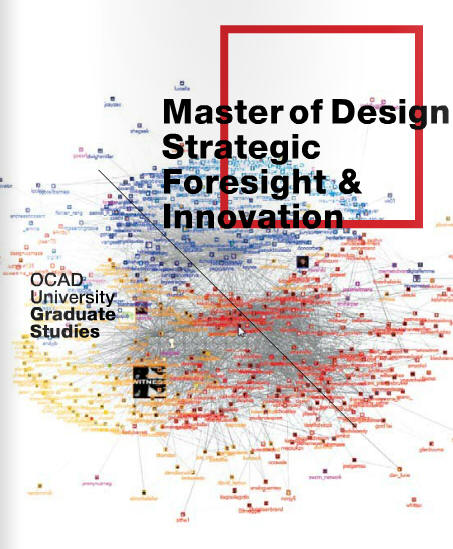
OCAD University Ontario College Art & Design University Canada |
Master of Design Strategic Foresight & Innovation
OCAD University |
Master of Design in Strategic Foresight and InnovationRecognizing the increasing importance that design thinking can play in positively impacting society, enhancing business success and managing organizational change, students in the Master of Design in Strategic Foresight & Innovation program address the complex dilemmas of contemporary society. The program focuses on the application of foresight and design innovation methods to develop solutions that are transformative and sustainable—economically and environmentally—and that address human needs. The program interweaves design with social science, technology and business while providing the skills and knowledge to identify critical issues, frame problems and develop innovative solutions and implementation plans. Through holistic thinking in a co-creative environment, the designer, business person, social scientist and engineer will develop together the skills required for true socio-technological innovation. The MDes in Strategic Foresight and Innovation is a part-time program. The MDes in Strategic Foresight and Innovation is a part-time, two-year, 45 credit program, comprising:
In order to support the needs of students who may be working full or part time while completing the program, courses are clustered on one day per week, normally Thursdays or Fridays. It is expected that most students will complete the program in two years (six terms). ObjectivesThe Master of Design in Strategic Foresight & Innovation will graduate leaders in social innovation. Students will be encouraged to develop strategic innovations that create sustainable value; economically, ecologically, and that address pressing societal issues pertinent to their particular area of interest in the public, private or voluntary sectors. The program will enable students to:
Key Features
|
|||||||||||||||||||||||||||||||||||||||||||||||||||||||||||||||||||||||||||||||||||||||||||||||||||||||||||||||||||||||||||||||

Freie Universität Berlin Free University of Berlin Institute of futures Alemania |
M.A.F.
Master Arts Futures Studies |
|
|||||||||||||||||||||||||||||||||||||||||||||||||||||||||||||||||||||||||||||||||||||||||||||||||||||||||||||||||||||||||||||||
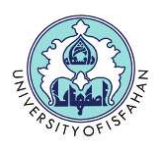
UNIVERSITY OF ISFAHAN |
Master degree in Futures Studies
2-Years |
Elective courses · Historical mega trends from macro historians’ view · Discussing the waves of change from Toffler’s view · Critically discussing the future from Macro History perspective · Discussing the concept of the fourth industrial revolution and later change waves |
|||||||||||||||||||||||||||||||||||||||||||||||||||||||||||||||||||||||||||||||||||||||||||||||||||||||||||||||||||||||||||||||
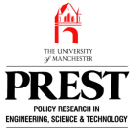
The University of Manchester United Kingdom |
M.Sc. Programme
Foresight, Futures and Prospectives Doctoral Programmein Science and Technology Policy and Management StudiesForesight, Futures and Prospectives |
The MSc Programme is a full time course over 12 months (arrangements for part-time study can be made). In the taught part of the course, students take a number of core and optional course units. The remaining six month period is spent on the research project and dissertation. The precise mix of course units and dissertation topic is determined partly by which M.Sc. pathway is chosen by the student, and by the student's own choice of course units. We currently offer four M.Sc. pathways: Technology Strategy and Innovation Management: This pathway concentrates on issues of innovation, knowledge and technology management. How do firms harness innovation in order to enhance their competitive advantage?Science, Technology and Governance: This pathway concentrates on social and political dimensions of science and technology. Why do governments invest in research, and how do they try to ensure value for money? What are the social, political and economic features of the scientific enterprise? How do policy makers deal with the risks and social problems created by science and technology?Innovation in the Knowledge Society: This pathway focuses on the impacts of the new technological revolutions in areas such as information technology and biotechnology, and on the supposed transition to a 'knowledge-based' economy. It also explores the extent to which innovation occurs in non-manufacturing and non-technology based sectors of the economy and society (such as the service, creative and public sectors).Foresight, Futures and ProspectivesThis pathway explores the use (and the usefulness) of foresight and futures methodologies (systematic attempts to explore possible future developments in technology or society) as a tool for policy or strategy makers in government and firms. The following page provides more detail on the pathways and course content. M.Res. ProgrammeOur new M.Res. Programme provides a more in-depth research training, combining specialist course units in quantitative and qualitative research methods and research design with options from the M.Sc. programme course units. M.Res. students go on to produce a research-based dissertation which is intended to provide the basis for future research work at the Doctoral level, and the programme is recognised for the receipt of ESRC studentships for suitably qualified UK/EU applicants under the 1+3 model. |
|||||||||||||||||||||||||||||||||||||||||||||||||||||||||||||||||||||||||||||||||||||||||||||||||||||||||||||||||||||||||||||||
|
|
Master in Previsione Sociale - Social Foresight |
||||||||||||||||||||||||||||||||||||||||||||||||||||||||||||||||||||||||||||||||||||||||||||||||||||||||||||||||||||||||||||||||
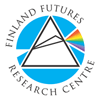
Finland Futures Research Centre, University of Turku Finlandia |
futures studies courses:
|
Contacts concerning FFRC's education activities:
Sari Söderlund, M.Sc.(econ.), Coordinator |
|||||||||||||||||||||||||||||||||||||||||||||||||||||||||||||||||||||||||||||||||||||||||||||||||||||||||||||||||||||||||||||||
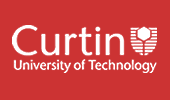
Curtin University of technology Australia |
Master of Futures Studies | MFutStds(Curtin) Course CRICOS Code: 042185E Registered Duration for International Onshore Students on student visas: 1.5 Years IntroductionFutures Studies has a role to play in helping shape the coming human future (Bell 1997). This unique course is multidisciplinary and incorporates both theoretical and experiential approaches. Of primary importance is the contribution futures studies can make to strategic thinking in business and society. That is, understanding the rapidly changing market conditions, customers and competitors in order to determine areas for growth, future demands and potential pitfalls. This type of thinking applies as much to government policy making as it does to private enterprise concerns. Graduates are armed with the tools to assist companies, governments and individuals with their strategic thinking and strategic decision-making by helping them envision alternative futures, plan for these alternative futures and manage any accompanying issues of organisational and societal change. Course Entry Requirements/PrerequisitesA strong academic record in a bachelor degree with at least three years relevant work experience in fields such as public policy, business, economics, humanities and health sciences. Recognition of Prior LearningApplications for recognition of prior learning are assessed on an individual basis. Duration and AvailabilityThis fee-paying course is of three semesters full-time or equivalent part-time study. Students may complete the program within one year. Individual units may be undertaken with a certificate of completion issued. Intermediate AwardsA student who has successfully completed all the requirements of the Graduate Certificate in Futures Studies or the Graduate Diploma in Futures Studies may apply under exceptional circumstance provisions for graduation in that award, subject to approval of the Head of School/Department. For further definition refer to the Statement and Awards section under General Information. Course OrganisationThe program consists of six coursework units and a research project and report. The coursework units are run sequentially as three week intensive programs. Compulsory attendance is required at six presentations by guest 'future thinkers' to encourage broad thinking on futures issues. Where possible the research project should be related to the student's area of work. The topic selected must be approved by the student's employer and the Course Coordinator. Appropriate University staff members will be assigned to supervise the project. Research will be conducted during second semester and the report written over the ensuing summer period. Full-time students will need to submit their research report in the early part of first semester of the year following enrolment. Part-time students must successfully complete all coursework units before commencing their research project. Additional Course ExpensesStudents may be expected to purchase a number of textbooks, readers and other vital study materials. Additional costs for accommodation during residential segments and for outdoor activities related to the course will apply. |
|||||||||||||||||||||||||||||||||||||||||||||||||||||||||||||||||||||||||||||||||||||||||||||||||||||||||||||||||||||||||||||||

ORU Oral Roberts University USA Oklahoma |
PhD Leading strategic
Jay Gary |
RESEÑA DEL PROGRAMAEl Doctorado en Liderazgo Estratégico (DSL, por sus siglas en inglés) de la Universidad Oral Roberts es un programa multidisciplinario para profesionales de carrera media a avanzada apasionados por su propósito y por resolver problemas del mundo real a través de la investigación participativa. Al finalizar, el graduado de DSL puede reformular su futuro, crear un cambio significativo y cultivar el talento a través del entrenamiento. Más que esto, el compromiso de ORU de educar a la persona en su totalidad—espíritu, mente y cuerpo—realmente puede distinguirlo como un líder empoderado por el Espíritu con un doctorado. Entrará en su destino como un líder completo que puede empoderar a las personas, los equipos y las organizaciones para que alcancen el potencial que Dios les ha dado. ¿UN DSL AVANZARÁ MI CARRERA?Su título avanzará en su carrera, sin importar en qué industria trabaje:
¿QUÉ CURSOS DISTINTOS TOMARÉ?
¿QUÉ CONCENTRACIONES PUEDO ELEGIR?Sobre la base de distintos cursos básicos y en preparación para su proyecto de doctorado, los estudiantes de DSL de segundo año toman una concentración de 3 cursos que los califica para rendir un examen de acreditación en una de las tres áreas:
A través de su Doctorado en Liderazgo Estratégico, se basará en la teoría y la práctica vitales para el éxito organizacional. |
|||||||||||||||||||||||||||||||||||||||||||||||||||||||||||||||||||||||||||||||||||||||||||||||||||||||||||||||||||||||||||||||

IKIU Imama Khomeini International University Iran |
Doctorate degree in Futurology
Code 1060 |
Litaratura and Humanities Faculty
Futures Studies Research Center |
|||||||||||||||||||||||||||||||||||||||||||||||||||||||||||||||||||||||||||||||||||||||||||||||||||||||||||||||||||||||||||||||

Palacky University in Olomouc Czech Republic |
Master´s Programme in Foresight for Environment and Development | 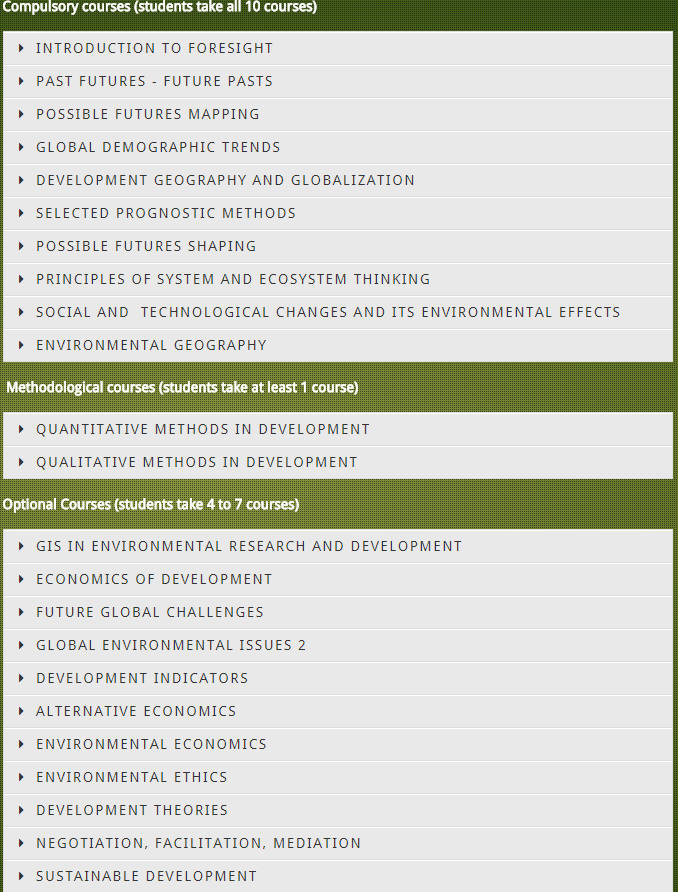 |
|||||||||||||||||||||||||||||||||||||||||||||||||||||||||||||||||||||||||||||||||||||||||||||||||||||||||||||||||||||||||||||||

University of Durham |
|||||||||||||||||||||||||||||||||||||||||||||||||||||||||||||||||||||||||||||||||||||||||||||||||||||||||||||||||||||||||||||||||

University of Notredame Francia |
Assistant Professional Specialist - Organizational Behavior / Foresight |
Position and Qualifications. The Management Department in the Mendoza College of Business at the University of Notre Dame is pleased to announce an opening for July 2013 in the area of Organizational Behavior/Foresight at the Assistant Professional Specialist level. This is predominantly a teaching position although there will be some research expectations. The position’s primary teaching responsibility will be Foresight in Business and Society. The ideal candidate will also be able to teach Principles of Management, an introductory undergraduate management core course. In addition, the ideal candidate will be able to participate in research projects with the department’s faculty. Candidates must possess an earned graduate degree or the strong prospect of earning such a degree by July 2013 in a business-related field. Candidates should possess and present evidence of excellent teaching skills. Applications. Completed applications should include a cover letter indicating the candidate’s specific interests, curriculum vitae, evidence of relevant past teaching experience (such as course syllabi), any teaching evaluations, and the names of three references familiar with the candidate’s academic work. Materials should be sent to: Management Department, attn: OB/Foresight Email contact: mgtdept@nd.edu The Department and University. Founded in 1842, Notre Dame is one of the largest and best known Catholic universities in the world. Over the last 30 years Notre Dame has aggressively pursued its goal to become the major Catholic research institution and is consistently ranked among the nation’s top 25 universities. Notre Dame enrolls approximately 11,000 students – with approximately 75% at the undergraduate level. The Mendoza College of Business offers nationally ranked undergraduate, MBA and Executive MBA programs. The Management Department includes faculty in areas spanning organizational behavior, human resource management, strategic management, business ethics, IT management, operations management, and quantitative methods. The College administration and Department faculty have created a high-energy, high-performance culture that encourages and supports excellence in research and teaching. For more information about our programs please visit the Mendoza College of Business website (http://business.nd.edu/) or the Management Department website (http://business.nd.edu/management/). The University of Notre Dame is committed to diversity in its staff, faculty and student body. As such, we strongly encourage applications from members of minority groups, women, veterans, individuals with disabilities, and others who will enhance our community. The University of Notre Dame is an EEO/AA employer. |
|||||||||||||||||||||||||||||||||||||||||||||||||||||||||||||||||||||||||||||||||||||||||||||||||||||||||||||||||||||||||||||||
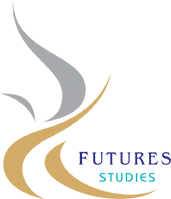
FoGuang University Graduate Institute of Futures Studies Taiwan |
M.A. and B.A degrees in Futures Studies |
Department of Futures Studies: Graduate Institute of Futures Studies is the first academic institute in Taiwan or Asia that incorporates theories and practice of futures studies to explore the trend of national politics, economy, culture, society, and environment. Future Studies is recognized a mainstream of knowledge system in the 21st century; thus, cross-field integration, instead of traditional field or course-based instruction is implemented in the curriculum. Such design is intended to establish the theory system of futurology, and conduct aggregate research on human lives. We aim to cultivate our students observation and forecast capabilities in research. Educational Goals
|
|||||||||||||||||||||||||||||||||||||||||||||||||||||||||||||||||||||||||||||||||||||||||||||||||||||||||||||||||||||||||||||||
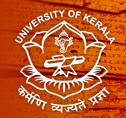
University of Kerala Department of futures studies India |
PhD and M.Phil in Futures Studies | Department of Futures Studies of the University of Kerala is a proactive interdisciplinary Department established by UGC in 1990-91. It has won the credit of introducing M.Tech in Technology Management for the first time in India. An interdisciplinary M.Phil in Futures Studies, UGC innovative Programme - Post Graduate Diploma in Knowledge Management and Ph.D. programmes are offered by the Department. The alumni of the Department now occupy significant top level and middle level positions in various Multi-national Companies, Central and State Government Organizations/Departments The AICTE approved M.Tech Programme in Technology Management specializes in Strategic |
|||||||||||||||||||||||||||||||||||||||||||||||||||||||||||||||||||||||||||||||||||||||||||||||||||||||||||||||||||||||||||||||
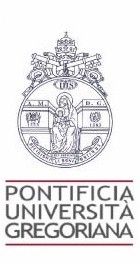
Pontificia Universitá Gregoriana Italia |
Bachelor and PhD degrees in Futures Studies with a Human and Social Perspective | ||||||||||||||||||||||||||||||||||||||||||||||||||||||||||||||||||||||||||||||||||||||||||||||||||||||||||||||||||||||||||||||||
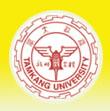
Taiwan |
in Futures Studies |
Graduate Course DescriptionsD0010 Theoretical Approaches to the Future (3/0)This course develops the academic basis for futures studies. The origins, approaches, philosophical foundations for the field are explored, as well as questions around the futures of futures studies. D0011 Macrohistory and Macrohistorians (2/0)This course examines various perspectives on individual, social, and civilizational change. Macrohistory is the study of social systems, along separate trajectories, in search of patterns. D0019 Science, Technology and Future Society (0/2)This course aims to discuss the following questions: How can the ethical-legal-socio system become more future-oriented? How will artificial intelligence change how law is conducted? What is the impact of issues such as globalization on the future of international law? What is terrorism and world law? Can law keep up with changes inworld economy and technology? Is a Science court needed to address issues such as the rights of robots? S0467 Applied in Statistics (0/3)This course provides graduate students with a systematic treatment of the quantitative study. The major issues include testing the research hypothesis, Ch-square test and Non-parametric statistics, Analysis-of-Variance, the simple and multiple variables regression, dummy and regression diagnostics, and Time Series analysis. Many of the statistical software packages, including SPSS+, Minitab and SAS, are also employed in the practical assignments. Finally, students should learn how to conduct a set of survey data, to solve some common problems, and to interpret the complex findings of the empirical studies. D0073 Philosophical Elements of Futures Studies (2/0)This course is designed to discuss the traditions of Futures Studies, including economic trend and predictions, sociological context analysis, the origin and result of change and development, and construction of time and space by philosophical perspectives. D0012 Social Science Research Method (3/0)This course is based on the training of social science. What’s a fact? What’s a problem? How to observe social facts? What is a research? How to operate a concept and construct a theoretical framework? And how to collect and analyze data will also be discussed. D0023 Methods in Futures Studies (0/3)This course investigates the methods used in futures studies. These include: scenario development, causal layered analysis, futures wheels, visioning, trend analysis, emerging issues analysis and backcasting. D0075 Trend Analysis – Exploring the Long Term Future (2/0)This course aims to discuss: What is the long term future of humanity? What are the critical factors necessary for survival and trivial? Can the long term future be forecasted? D0076 Designing the Future (0/2)The course focuses on how to create the future. Design implications in created preferred futures are explored. What is the difference between the good and the perfect society? How can one ensure that one's political and social design is robust and does not close the future? D0018 Change and Development (0/3) Theories of social change are based on organizational traditions that emphasized on innovation, control, plan and management. The objective of this course employs change and development theories to explore the futures of business organizations and nations, particularly on the impact of globalization and the post-colonial societies. D0013 Organizations and Movements in Futures Studies (2/0)This course aims to discuss: Which organizations support the work of futurists? Where are they located? What are case studies of successful use of the futures studies approach? Which movements are future oriented (or are they all single issue present based)? D0014 Technology, Innovation and Learning (2/0)This course aims to discuss: What are the trends in pedagogy? How can educational systems be more future oriented? What are the case studies to support innovation in education? What will the education system of the future look like? D0020 Leisure and Working Society (0/2)Leisure gradually replaces traditional working patterns and become a new lifestyle for future societies. Whether leisure will replace working or not? Will leisure create more working opportunities? Is leisure only a special working pattern? Those questions will create more discussions in this course. D0021 Multiculturalism and Population Change (0/2) What’s multiculturalism? Through global village or local Taiwanese perspectives, this course leads students to explore problems of multi-ethnics, and conflicts of the majority and minority. Meanwhile, we discuss with the result of the coming elderly society and complex patterns and relations of families. D0077 Eco-Economy and Sustainable Development (2/0)The core of this course is sustainability, as alternative to economic progress. It is designed to create rooms for constructive debates and provides paths for humanity to guarantee present and futures generations to satisfy their needs. D0078 Health Futures (0/2)This course presents critical trends and scenarios that are crucial: globalization, the internet revolution, the genetics revolution and the multicultural swing. Either as full-blown or emerging issues create healthy futures that will be unrecognizable to us. D0087 Vision and Alternative Futures of Public Policy(2/0)The evaluation on a governmental policy usually is focused on its implicit and explicit goals. It is not unusual to see some policies are used to achieve certain political interests without comprehensive consideration. A wrong policy imposes great cost on every aspect of the society and should be avoided. This course uses the methodology of Futures Studies-"Vision-Picture-Strategy"- to build appropriate model for policy making and evaluation. D0088 Designing the Future (0/2)This course focuses on how to create the future.Design implications in created preferred futures are explored. What is the difference between the good and the perfect society? How can one ensure that one's politicaland social design is robust and does not close the future? D0015 Regional Development and Globalization (2/0)This course examines the impact of globalization on regional development, including national level, Asia-Pacific areas, and the world. Globalization will be emphasized on the impact of multi-national enterprises, labor force migration, industrial clusters, capital interventions and technological innovations. D0022 Post-colonial Futures Society (0/2)What are the related issues in post-colonial societies? How to imagine or adjust the paradox of the post-colonial society? After the trend of economic globalization, the new pattern of division of labor among the world’s economic system is gradually organized. This course will discuss the new dominant-dependent network of economic, culture, social and politics among nations. D0079 Biotechnology and Risk Society (2/0)Adopting theoretical perspectives from risk society, this course intends to explore level of societal realization toward genetic engineering. Public interest, value orientation, and associated attitude are among the focus of issues. D0080 Network and Information Society (2/0)Questions and discussions will be the focus of this course. What are the characters of the segmented polysepalous network? What are the Learning Networks? How is the bureaucracy in the future? How are the Social Networks good for the development of the globalization? D0081 Religion and Civilization Conflicts (0/2)This course starts with the intertwined relationship between technology and religion. What’s the religion and global consciousness in the future?What is the value of the New-Thought Churches? What are Scenarios for adherents of world religions? What is Religion of Humanity? A2033 Issues in Futures Studies (2/0)This course explores problems, trends and emerging issues in futures studies. These include: health futures, developments in genetics, innovation in technology particularly artificial intelligence, demographic changes, military futures, and gender futures. D0016 & D0017 Proseminar I & II (1/1)This introductory seminar will serve as a thorough academic orientation for postgraduate students. The focus is to provide necessary skills toward how to become professional futurists. D0090 Practical Uses of Futures Knowledge (2/0)The main purposes of the practical application are twofolE:/Google Drive to establish research and professional networks with government and business sectors, as well as non-profit organizations; moreover, to create opportunity for students to link futures studies with action learning approach. D0103 Futures Thinkers and Futures Thinking(2/0)Futures thinkers and futures thinking approaches the study of the future by analyzing futurists. These include academics and activists in the field. The following questions were asked of leading futurists. 1) What are the influences in your work? 2) What methods do you use in your futures studies? 3) What trends do you see creating the future? 4) What is your vision of the future? 5) References. The purpose of these questions was to gain insight into each scholar's story in futures studies. The purpose of this course, thus, is to better understand the theories, values and methods of futures studies by understanding the actors in the field. D0119 The Trend of Human Resource Management(2/0) This course will elaborate the futures issues in terms of human resource management. It will also focus on how globalization and glocalization impact the issues in selection criteria, and developing effective global managers. D0120 China's Economic and Political Change(0/2) This course is to help students inquire structural elements underling Chinese society. It covers political, economic and social issues which have been long debated. The course depicts the difficulties and opportunities China encounters in the process of modernization. D0121 Seminar on Global Trend Watch (0/2)The purpose of this seminar course is to provide students with an understanding of those mega trends or future topics of the new era.It focuses on regional development, global governance, knowledge based economy, innovation and social change.This course applies both theoretical lectures and practical visits. D0122 Multicultural Studies & Organizational Change(2/0)This course focuses on elaborating the multicultural issues in changing and developing organization. Organization development will energize the talents of individuals within the organization members in the pursuit of their own self-interests on making the organization more successfully and making their quality of working life more satisfying. D0123 Globalization and Transnational Migration (0/2)The national state was usually understood as an imaged community with a single people, an undivided loyalty to a common government, and a shared past within this people. Hence immigrants were forced to abandon or deny their ties to their societies of origin. Globalization and transmigrants, however, have greatly changed this situation. Transmigrants construct their simultaneous embeddedness in more than one society and preserve their culture and identity to societies from which they emigrated. This course attempts to discuss this new phenomenon from various viewpoints like transnationalism, citizenship, methodological nationalism and multiculturalism, etc. Some case studies in Taiwan are also included. D0124 Philosophy of Futures Studies (2/0)This course explores the philosophical foundations of futures studies. We examine issues about meaning of planning and possibility of predication. Discussion of these questions are from the writings of contemporary philosophers such as Ossip K. Flechtheim, Max Weber, Jürgen Habermas, Karl Popper and Hans Jonas. D0125 Applied Ethics (0/2) This is a seminar on issues concerning applied ethics. Topics include the problem of sexual equality, legitimating crisis of capitalism, biomedical ethics, animal rights and idea of global democracy. We will approach these topics by examining answers provided by contemporary discourse ethics. T 8000 Thesis (0/4) |
|||||||||||||||||||||||||||||||||||||||||||||||||||||||||||||||||||||||||||||||||||||||||||||||||||||||||||||||||||||||||||||||

Italia |
Master in Social Foresight |
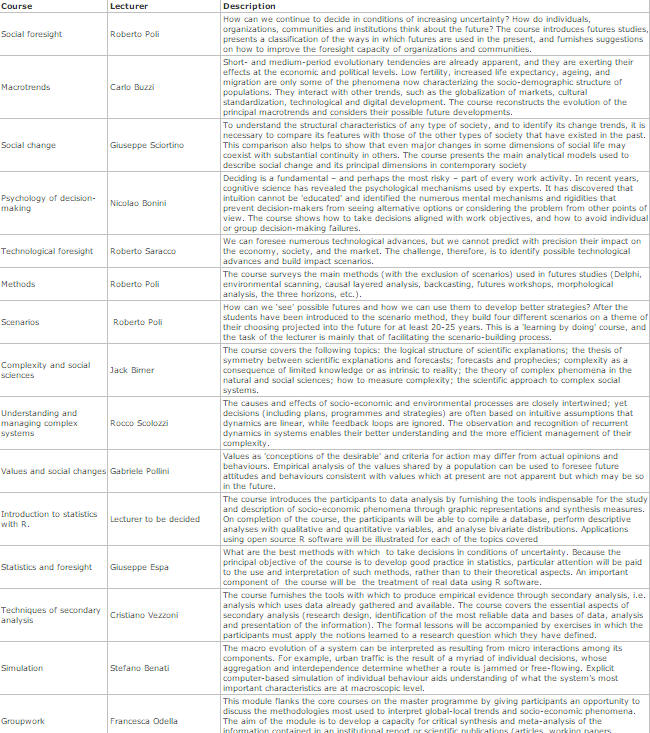 |
|||||||||||||||||||||||||||||||||||||||||||||||||||||||||||||||||||||||||||||||||||||||||||||||||||||||||||||||||||||||||||||||
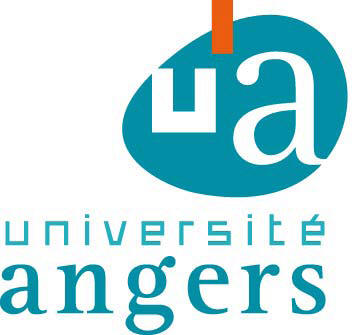
Université angers - ISTIA Institut des Sciences et Techniques de l’Ingénieu Francia |
International Master Foresight and Innovation |
International Master of Science of the University of Angers Foresight and Innovation
Year 1 Paradigm Shift Year 2 Shaping the world Intended Graduate Career Options: |
|||||||||||||||||||||||||||||||||||||||||||||||||||||||||||||||||||||||||||||||||||||||||||||||||||||||||||||||||||||||||||||||
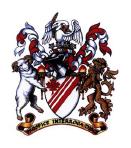
Revans University – The University of Action Learning USA |
Certificate, Diploma and Masters degrees in Futures Studies, | ||||||||||||||||||||||||||||||||||||||||||||||||||||||||||||||||||||||||||||||||||||||||||||||||||||||||||||||||||||||||||||||||

Moscow State University Rusia |
BA and MA degrees in Social Forecasting | Moscow State University Faculty of Sociology in Russia offers BA and MA degrees in Social Forecasting. The program includes history, methodology, and techniques of technological forecasting in such social spheres as labour, state and law, family, school, science, culture, health, urbanisation, environment, drugs and crime. The program has existed since 1969. It had 175 students in 2002. Contact Prof. Igor Bestuzhev-Lada | |||||||||||||||||||||||||||||||||||||||||||||||||||||||||||||||||||||||||||||||||||||||||||||||||||||||||||||||||||||||||||||||
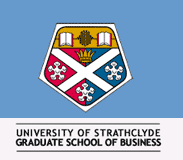
University of Strathclyde Escocia |
Executive Development Programmes in Scenario Thinking | ||||||||||||||||||||||||||||||||||||||||||||||||||||||||||||||||||||||||||||||||||||||||||||||||||||||||||||||||||||||||||||||||

Malta |
European M.Sc. Masters Programme in Strategic Innovation and Future Creation
Edward de Bono |
The International Joint Masters in Strategic Innovation and Future Creation is specifically designed for people who:
The official launch of this exciting new Masters program will take place during a two-day International Conference in Strategic Innovation and Future Creation which will be held in Malta on 23 - 24 March 2009. The first intake of students will begin the course in October 2009.
The M.Sc. in Strategic Innovation and Future Creation is split into four main subject areas, namely creativity and idea generation, innovation management, entrepreneurship and foresight/futures studies. The programme will be delivered mainly by asynchronous e-learning complemented by four intensive residential seminars of one week each, spread over two years (one week at each partner University). Course ScheduleThe M.Sc. will be delivered mainly by asynchronous e-learning and this offers students a great degree of autonomy and flexibility. The online component will be complemented by four intensive residential seminars of one week each, spread over two years (one week at each partner University).Find out more Creativity and Idea GenerationAn increased focus on developing creative thinking tools and idea generation techniques across the world indicates a broadly shared view that creativity is crucial to success. This module offers a variety of perspectives on creativity. Students will gain an understanding of the implications of creativity and its applications. Interactive workshops will enable students to apply the tools of creative thinking in organisations.
Innovation ManagementInnovation usually concerns products, services and processes, but innovation management does not just encourage 'innovation' as in technical or reseach and development. It also guages the impact of sustanability of innovation, managing both the demand and supply variables over medium to long-term time frames. Innovation Management study units:
EntrepreneurshipEntrepreneurship involves cultivating an attitude to recognize opportunities and to take risks - this requires the skill of creativity and it allows for the generation of alternatives, possibilities and and an ability to search for multiple ways in which to recognize, develop and implement ideas and projects. Entrepreneurship should not only be considered as an area where people are encouraged to set up their own business, although this is an important aspect which should not be neglected as new start-ups are essential for a healthy economy and subsequent increased employment opportunities.Entrepreneurship involves the performance necessary to put ideas into practice. A broader interpretation of the concept of entrepreneurship involves the acquisition of skills and competencies which are valuable to foster the entrepreneurial spirit both for those who intend to start up their own business and for those in employment. Entrepreneurship study units:
Foresight / Futures StudiesForesight involves taking a leap into the distant future to create scenarios and visions. It is possible to design, create and work towards specific scenarios and visions in an attempt to act now, either to arrive at a desirable future or to mitigate unfavourable circumstances.A number of methodologies are available and are applied mainly in the areas of policy (ICT, science and technology, environment and energy) as well as in private organisations (corporate foresight). The design of novel and desirable future scenarios draws on the skills of creativity as it involves the generation of novel ideas and possibilities. The implementation of policies to arrive at a desirable future requires knowledge of strategic innovation. Foresight study units:
Research MethodsA module on research methods will also be included to enable students to develop a deeper understanding of empirical research involved in the four main subject areas of this M.Sc. programme.Research Methods study unit:
DissertationStudents will be required to complete a dissertation worth 30 ECTS during the fourth semester to reach the 120 ECTS total to achieve the master’s award. Find out more |
|||||||||||||||||||||||||||||||||||||||||||||||||||||||||||||||||||||||||||||||||||||||||||||||||||||||||||||||||||||||||||||||

Instituto Tecnológico de Monterrey México |
Maestría en Prospectiva estratégica Guillermina Benavides |
CURSO SELLOLiderazgo y ética en el ejercicio de la función pública CURSOS BÁSICOS Introducción a la prospectiva estratégica Visión global y megatendencias CURSO DE FUNDAMENTOS Métodos de pronóstico para series de tiempo CURSOS DE INVESTIGACIÓN Métodos cualitativos para la investigación Proyecto de investigación aplicada CURSOS OPTATIVOS Prospectiva para la innovación tecnológica Prospectiva territorial y urbana Prospectiva y gestión ambiental Desarrollo y administración de los sistemas de inteligencia estratégica Teoría de juegos para la cooperación, coordinación y negociación Métodos avanzados para la prospectiva estratégica y estudios de futuro Métodos cuantitativos aplicados a las ciencias sociales Políticas públicas para el desarrollo regional Evaluación social de proyectos Globalización y estrategia de políticas para el desarrollo |
|||||||||||||||||||||||||||||||||||||||||||||||||||||||||||||||||||||||||||||||||||||||||||||||||||||||||||||||||||||||||||||||

México |
Maestría En Planeacion Estratégica y Prospectiva Zidane Ziraoui Marco Moreno |
Objetivo GeneralFormar especialistas que, con rigor metodológico y sustento en distintos enfoques, apoyen tanto a las instituciones públicas como a las empresas privadas y los organismos sociales, en la planeación y la toma de decisiones con información que anticipe situaciones previsibles. Objetivos particularesa) Formar personal especializado en los distintos fundamentos y enfoques contemporáneos de los estudios de futuro. b) Formar especialistas con sensibilidad para identificar y priorizar aquellos factores de causalidad, con potencial para incidir en el curso de situaciones previsibles. c) Formar personal que, con los métodos y técnicas más actuales, tenga capacidad para generar la información que permita construir escenarios alternativos consistentes con los enfoques empleados. Áreas de Investigacióno Sociedad, política y gobierno o Desarrollo regional y sustentabilidad o Economía y competitividad o Cultura y educación Perfil del egresadoEl egresado de laMaestría En Planeacion Estratégica y Prospectiva de El Colegio de Tamaulipas: Conoce los distintos fundamentos y enfoques de los estudios de futuro contemporáneos Identifica, estudia y explica, con rigor metodológico, los factores “futuribles” que tienen capacidad para incidir en situaciones previsibles Genera y procesa información relevante para construir escenarios prospectivos que apoyen a la toma de decisiones y a la planeación del desarrollo. Puedes consultar el plan de estudios de la Maestría En Planeacion Estratégica y Prospectiva: Aqui |
|||||||||||||||||||||||||||||||||||||||||||||||||||||||||||||||||||||||||||||||||||||||||||||||||||||||||||||||||||||||||||||||
| Universidad Tecnológica Metropolitana UTEM
México |
Prospectiva e Innovación Tecnológica (ProteinLab) | El Programa de Prospectiva e Innovación Tecnológica (ProteinLab) está a cargo de un grupo de investigación interdisciplinario de la UTEM y depende de la Dirección de Investigación y Desarrollo Académico. Está dedicado al estudio del impacto del uso de las tecnologías digitales y sustentables para el diseño y desarrollo de nuevos productos e interacciones entre las personas y su entorno.
PROSPECTIVA E INNOVACIÓN TECNOLÓGICA (ProteinLab) Encargado
|
|||||||||||||||||||||||||||||||||||||||||||||||||||||||||||||||||||||||||||||||||||||||||||||||||||||||||||||||||||||||||||||||
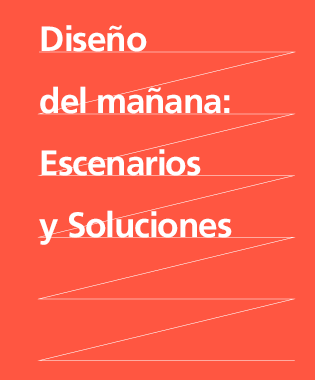
México |
Especialidad
Diseño del mañana: Escenarios soluciones Centro |
SEMESTRE IMétodos prospectivos SEMESTRE IIEscenarios de innovación disruptiva Contar con título de licenciatura* | Portafolio de proyectos | Carta motivos | Entrevista | Aprobar propedéutico remedial | Mínimo de 480 puntos de TOEFL o equivalente Inicio: Enero 2016 Duración: 1 año (2 semestres) INFORMES: Coordinación de Promoción Posgrados T. 2789 9000 exts. 8811, 8853 y 8905 Horarios: Lunes de 18 a 20 horas y sábados de 10 a 14 horas |
|||||||||||||||||||||||||||||||||||||||||||||||||||||||||||||||||||||||||||||||||||||||||||||||||||||||||||||||||||||||||||||||

Centro de Estudios para el Desarrollo Municipal y Políticas Públicas CEDES Universidad Autónoma de Chiapas UNACH México |
|
El egresado de la Maestría en Prospectiva y Estudios Estratégicos será competente para: • Desempeñarse profesionalmente en espacios de trabajo académico, en los sectores público y privado, en organismos regionales e internacionales y en la asesoría y consultoría, relacionados con tareas de diagnóstico político y social, con el diseño e instrumentación de políticas de Estado, en la formulación de escenarios, en el análisis de riesgo y la evaluación de sus impactos, así como en los estudios prospectivos. • Comprender mejor la realidad social y política del estado de Chiapas y de México. • Manejar el instrumental teórico y metodológico en la formulación de alternativas estratégicas, en el curso de las tendencias económicas y políticas predominantes en la región. • Utilizar los enfoques metodológicos en la formulación de políticas generales, así como en planes y programas concretos de gobierno. • Seguir el curso de los conflictos, prever tendencias, adelantarse a los acontecimientos y realizar estudios de futuros posibles y viables. • Realizar estudios de impacto social y económico, de competitividad y de gran visión estratégica. • Ser agentes de cambio que promuevan con ética y compromiso social alternativas para el desarrollo
|
|||||||||||||||||||||||||||||||||||||||||||||||||||||||||||||||||||||||||||||||||||||||||||||||||||||||||||||||||||||||||||||||
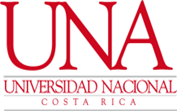
Universidad Nacional de Costa Rica |
Maestría Pensamiento estratégico y Prospectiva | 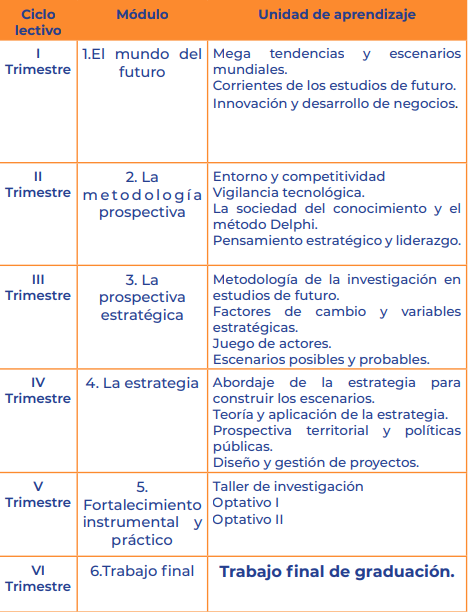 |
|||||||||||||||||||||||||||||||||||||||||||||||||||||||||||||||||||||||||||||||||||||||||||||||||||||||||||||||||||||||||||||||

Perú |
Maestría en Prospectiva estratégica
Perú |
Capacitar profesionales de todas las áreas del conocimiento, como líderes responsables con una visión global e interdisciplinaria, interesados en examinar el mañana para así ser competitivos en el presente, capaces de tomar decisiones estratégicas mediante el empleo de técnicas de prospectiva anticipándose a los cambios futuros en las áreas económica, política, territorial, tecnológica, energética, seguridad, defensa, cambio climático y ambiental.CICLO I: |
|||||||||||||||||||||||||||||||||||||||||||||||||||||||||||||||||||||||||||||||||||||||||||||||||||||||||||||||||||||||||||||||

Universidad Nacional Mayor San Marcos Lima - Perú |
Maestría en Prospectiva estratégica para el desarrollo nacional |
Primer Semestre
Segundo Semestre
Tercer Semestre
Cuarto Semestre
|
|||||||||||||||||||||||||||||||||||||||||||||||||||||||||||||||||||||||||||||||||||||||||||||||||||||||||||||||||||||||||||||||

Universidad Externado de Colombia Código SNIES Doctorado: Código SNIES Maestría: 55110 Código SNIES Especialización: 11265 Colombia |
Doctorado
Maestría en Pensamiento estratégico y prospectiva |
|
|||||||||||||||||||||||||||||||||||||||||||||||||||||||||||||||||||||||||||||||||||||||||||||||||||||||||||||||||||||||||||||||
| Especialización en Pensamiento estratégico y prospectiva | Para formar profesionales en el diseño y construcción del futuro de la empresa y en el uso de estrategias e instrumentos que les permitan ejercer un monitoreo constante para la dirección de organizaciones en mercados altamente competitivos, el programa ofrece el siguiente plan de materias:
|
||||||||||||||||||||||||||||||||||||||||||||||||||||||||||||||||||||||||||||||||||||||||||||||||||||||||||||||||||||||||||||||||
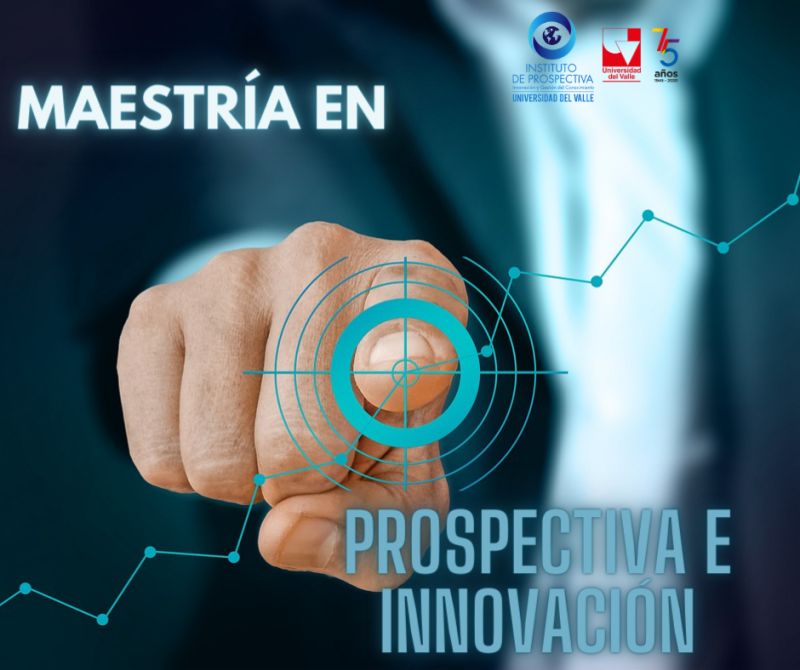
Universidad del Valle Código SNIES 109558 Colombia |
Maestría Prospectiva e innovación
Instituto Prospectiva U. del Valle Javier Medina Vásquez |
|
|||||||||||||||||||||||||||||||||||||||||||||||||||||||||||||||||||||||||||||||||||||||||||||||||||||||||||||||||||||||||||||||
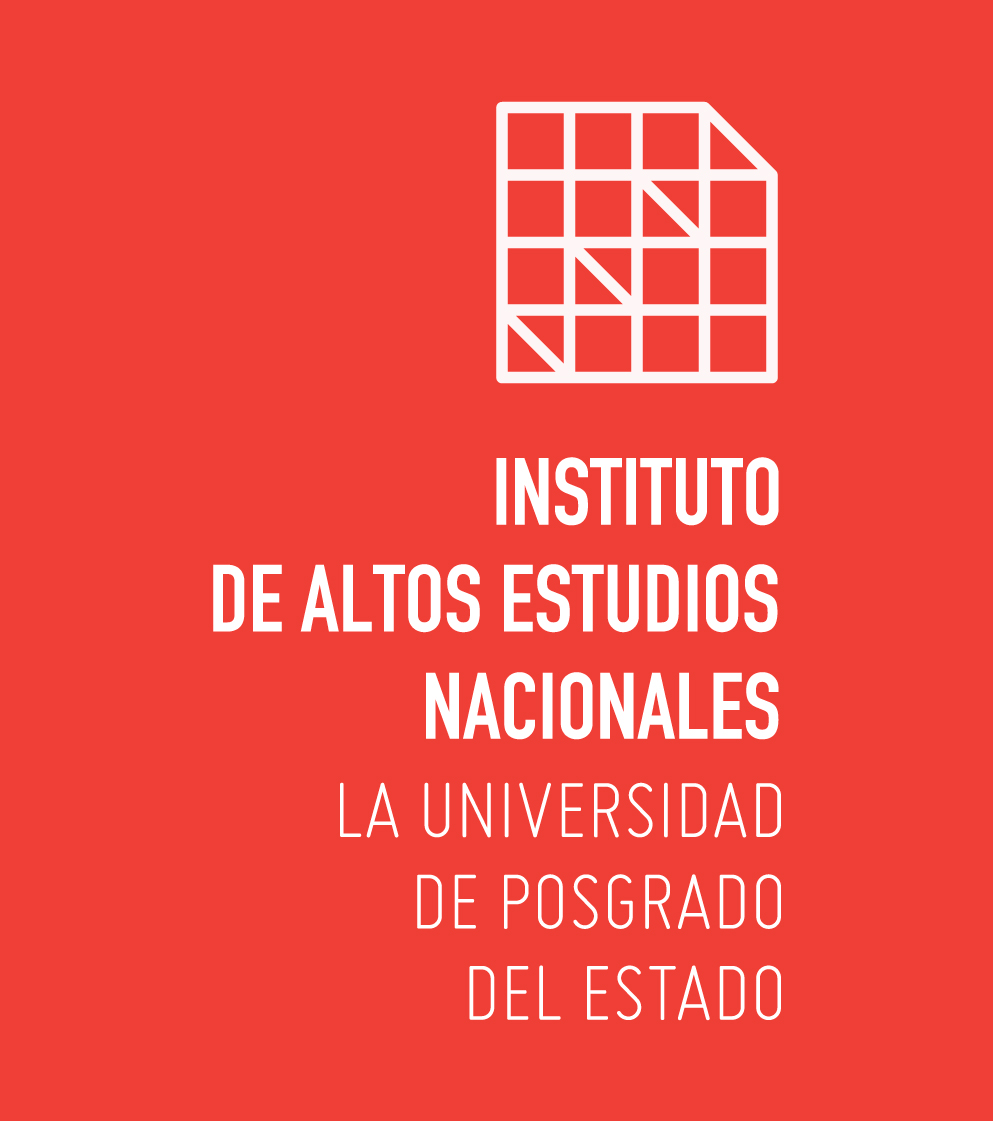
Ecuador - Quito |
Maestría en planificación y prospectiva multisectorial |
Malla curricularMODULO 1Introducción a los estudios del futuroEntre las temáticas que se aborda; Escuela americana con el Forecasting y la francesa con la Prospectiva, Entre los principales temas se consideran: (I) Principales diferencias entre Forecasting y Prospectiva (II) Think Tanks (tanques de pensamiento) que realizan estudios en cada metodología. (III) LIPSOR y Millenium Project. (IV) Casos de aplicación en otros países (V) Investigadores más importantes en cada escuela Análisis y Metodología ProspectivaEntre las temáticas que se abordan; la escuela francesa de estudios de futuro, caja de herramientas de Michel Godet: (I) Análisis del Estado del Arte y Tendencias futuras: PESTAL y Árbol de Giget (II) Identificación de factores de cambio: FODA prospectivo (III) Definición de variables estratégicas: Ábaco de Régnier (IV) Elaboración de escenarios: Ejes de Schwartz y Matriz morfológica (V) Estrategias para la construcción del escenario apuesta: Matriz IGO (VI) Juego de actores para escenario apuesta : MACTOR Planificación y Política PúblicaEntre las temáticas principales: (I) Diagnóstico del entorno mediante un análisis PESTA (político, económico, social, tecnológico y ambiental) desde el ámbito nacional hasta local (II) Articulación entre la planificación y las políticas públicas como medios para lograr los objetivos de un plan de desarrollo, desde la identificación de los problemas sociales hasta la evaluación de la política pública. Planificación, Seguimiento y EvaluaciónEntre las temáticas: (I) conceptos y herramientas necesarias para que a partir del escenario apuesta identificado en el análisis prospectivo (II) La planificación en territorio e institucional (III) El seguimiento y evaluación a las actividades planificadas (IV) Análisis GBR – Gestión Basada en Resultados, (Hacer, Aprender y Mejorar), emprende acciones correctivas de mejora (V) toma decisiones fundamentadas y gestiona mejor los riesgos y oportunidad es (VI) Se utilizarán casos reales que vayan de acuerdo a la realidad individual profesional, a la planificación nacional y e l posicionamiento del Ecuador en la región. MODULO 2Geopolítica e Integración RegionalEntre las temáticas que se abordan: (I) Reconocer, comprender y debatir la construcción del campo de la Geopolítica, tomando en cuenta el desarrollo disciplinar en su relación con la Geografía Política, y las múltiples relaciones entre territorio, recursos materiales, económicos; y dimensión social y construcción cultural asociados al espacio y al manejo del mismo. (II) Revisión de autores clásicos y contemporáneos relevantes, tanto a nivel mundial, como a nivel regional y nacional. (III) Análisis de los núcleos de conflictividad en la Geopolítica contemporánea, también dialogará transversalmente con los actuales y probables a futuro posicionamiento se intereses del Ecuador frente al orden mundial, con especial énfasis en las iniciativas de integración. (IV) Análisis de Problemas contemporáneos y escenarios proyectivos sobre América Latina en la Geopolítica Mundial y la relación entre Geopolítica, recursos naturales, energía e infraestructura. Economía Política InternacionalEntre las temáticas que se abordan: (I) La Economía del Mundo contemporánea desde una perspectiva teórica, histórica y estratégica. (II) Principales características de la Globalización y, sin excluir la trascendencia de los procesos “globales”. (III) Importancia de los bloques regionales en la Geografía económica mundial, analizando los flujos internacionales de comercio, inversiones, remesas y la implicación de la movilidad humana. (IV) Cambio estructurales en el patrón tecnológico y productivo, e n las inversiones y en el comercio internacional, así como los procesos de restructuración productiva. (V) Principales desafíos de Ecuador para alcanzar una inserción apropiada en la economía mundo. Inteligencia Estratégica y Prospectiva en SeguridadEntre las temáticas principales: (I) Abordar los debates entre disciplina científica y técnica alrededor de la Inteligencia diferencian d o e l ámbito del Estado y el que corresponde a otras áreas de la interacción humana. (II) Interpretación del conflicto en la seguridad y el análisis de escenarios considerando a la Inteligencia como una herramienta para la proyección de actividades económicas u comerciales MODULO 3Innovación para el DesarrolloEntre las temáticas principales se abordan: (I) Debate contemporáneo sobre modelos de desarrollo y alternativas al desarrollo, abordando la innovación desde el punto de vista de una reflexión crítica sobre conceptos como desarrollo sostenible, desarrollo basado en derechos, buen vivir, postdesarrollo, alter desarrollo y de crecimiento, entre otros. (II) Análisis de las relativas agendas de desarrollo y sus potencialidades para producir innovación en los territorios. Política Industrial y Cambio de la Matriz ProductivaEntre las temáticas que se abordan en esta asignatura están:(I) Restructuración económica en América Latina y el mundo(II)Pekín-Washington-Brasilia (III) Geopolítica y bases del pensamiento latinoamericano sobre el desarrollo(IV)Segunda independencia y política industrial (V) Planificación económica y prospectiva (vi)El pan y la palabra Estadísticas Aplicadas a la ProspectivaEntre las temáticas que se abordan: (I) Probabilidad y estadísticas a través del estudio y la práctica del análisis de datos. (II) Análisis numérico para escenarios prospectivos. (III) Algunos tópicos incluyen resúmenes numéricos, gráficos de datos, pruebas de hipótesis, intervalos de confianza, análisis de varianza, regresión, y análisis de datos conglomera dos. Seminario de Titulación con enfoque cuantitativoLas principales temáticas son: (I) Metodologías de investigación cuantitativa (II) Análisis de las perspectivas teóricas sobre los métodos de investigación cuantitativa y su aplicación (III) Revisión conceptual y la aplicación de herramientas de investigación para el análisis de la información y datos para la investigación (IV) Análisis de datos de tipo exploratorio: con técnicas cuantitativas. (V) Análisis de datos de tipo descriptivo: combinando estadísticas descriptivas con la estadística inferencial y el análisis estratégico medidas directas de intervención con objetivos específicos a mediano y largo plazo. (VIII)Problemas ligados al diseño, levantamiento, tratamiento, uso de la información y su interpretación como: sesgos en los datos, correlaciones espurias y el grave problema de endogeneidad. MODULO 4Nuevas Fuentes de Energía y Recursos NaturalesEntre las temáticas principales que se abordan: (I)Introducción a la gestión de recursos naturales con énfasis en energías renovables. (II)Conceptos y temas actuales relevantes a las discusiones de manejo y gestión de recursos naturales. (III) Una mirada a los recursos energéticos renovables, sus aplicaciones y sostenibilidad; energías renovables como la energía solar, energía eólica ,geotérmica e hidroeléctrica y las demandas energéticas actuales y las futuras. (IV) Políticas y proyectos energéticos nel Ecuador. (V) Desarrollo de pensamiento crítico sobre los problemas ambientales, sociales y económicos de las políticas energéticas en el país y sus posibles estrategias de manejo. Escenarios Futuros en TecnologíaEntre las temáticas principales:(I) Las nuevas tecnologías de la información y la comunicación (TIC) han venido creando o apoyando sistemas y redes innovadoras que afectan cada vez más a las sociedades y sus gobiernos, industrias, comunidades y personas. (II)Escenarios futuros sobre los que se cimentará esta tecnología y su influencia en la vida política, social, económica y otros de la nueva sociedad. (III) Fundamentos tecnológicos axiomáticos existentes sobre los que se desarrollará la nueva tecnología.(IV) Identificación de la tecnología que la podremos considerar como aceleradores de innovación, es decir aquella tecnología que está actuando y actuará como catalizador del desarrollo de la innovación tecnológica (V)Visualiza los futuros escenarios tecnológicos con los que vivirá la humanidad.(VI) Nuevos paradigmas que emergerán, no solo en el plano tecnológico, si non lo social, político y demás escenarios de la futura sociedad humana.( VIII )Desarrollo tecnológico en Ecuador. Seminario de Titulación con enfoque cualitativo Las principales temáticas son: (I)Metodologías de investigación cualitativa (II) Aspectos epistemológicos para herramientas y técnicas cualitativas; con entrevistas, análisis de discurso, encuestas, la observación etnográfica y observación participante, historia de vida; grupo focal, intervención sociológica(IV) Muestreo cualitativo; muestreo intencional, muestreo teórico, principio de saturación, entre otros ( V ) Análisis de datos cualitativos mediante el uso de software como N-vivo, AtlasTI (VI) Otras herramientas necesarias para lleva a cabo investigaciones científicas cualitativas rigurosas(VII) Discusiones Metodológicas, Epistemológicas y Ontológicas para definir el alcance y enfoque de la investigación (VIII) Diseño metodológico del Plan de Investigación ; Delimitación del tema por investigar; el planteamiento del problema y las preguntas de investigación la elaboración de antecedentes y justificación del tema de estudio; el planteamiento de objetivos generales y específicos de la investigación; construcción del estado de la cuestión en la investigación de la temática de prospectiva estratégica; elaboración del marco teórico y las principales herramientas conceptuales de análisis de la investigación; el planteamiento y la formulación e hipótesis de estudio; la planificación de la investigación, la redacción académica y el manejo de fuentes y referencias bibliográficas de acuerdo a las normas APA 6ta edición . |
|||||||||||||||||||||||||||||||||||||||||||||||||||||||||||||||||||||||||||||||||||||||||||||||||||||||||||||||||||||||||||||||

No ACTIVA Colombia |
maestria@esici.edu.co |

|
|||||||||||||||||||||||||||||||||||||||||||||||||||||||||||||||||||||||||||||||||||||||||||||||||||||||||||||||||||||||||||||||

Argentina |
Master degree in National Strategic Intelligence (Inteligencia Estratégica Nacional "Siglo XXI") | The Universidad Nacional de La Plata in Buenos Aires, Argentina offers a Master degree in National Strategic Intelligence (Inteligencia Estratégica Nacional "Siglo XXI"). The program’s futures studies include: scenario building, structural analysis, and regional scenarios (Mercosur etc.) Research methods include delphi, cross-impact, and others. It is a two years program with a final thesis. The program has existed since 1997. It had 145 students in 2002. Program * Introduction to strategy * National strategic intelligence * National defence * Planning 1 * Planning 2 * Planning 3 * Content Analysis * Origin and evolution of contemporary political concepts * Methodology of analysis * Global strategic visions * Argentina in a global political context Professional Seminar in Studies of the Future This seminar carries two objectives: 1) the clarification and communication of participant values, aspirations and preferable visions, 2) and the acquisition of practical tools in the investigation of change. The seminar aims to achieve a ‘confluence’ between participant projections of change and self knowledge gained through reflection. Contact |
|||||||||||||||||||||||||||||||||||||||||||||||||||||||||||||||||||||||||||||||||||||||||||||||||||||||||||||||||||||||||||||||

ESUMER Códigos SNIES: 54473 Virtual y 54085 Presencial Medellín - Colombia |
Especialización en Gerencia Prospectiva y Estratégica |
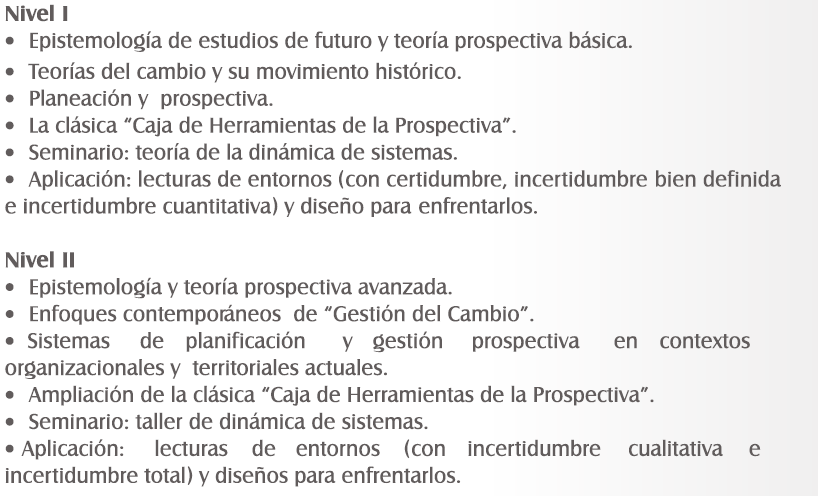
ESPECIALIZACIÓN EN PROSPECTIVA ORGANIZACIONAL (Especialización organizacional en 3 semestres No vigente) Formar especialistas integrales con alta capacidad de liderazgo, a partir de la comprensión de las técnicas modernas de dirección y gestión de proyectos y su práctica en distintas organizaciones públicas y privadas o en la creación de su propia empresa. Profesionales o tecnólogos que deseen complementar sus estudios con una especialización en Gerencia de Proyectos, cuyo contenido, apropiación de herramientas y metodología validan su carácter tecnológico y están de acuerdo con las reales necesidades de la empresa constituida o en formación. Se desarrollará un método que permita que el estudiante avance progresivamente en las fases de los proyectos: formulación, evaluación, programación, ejecución y control, para aplicar estos conceptos en un trabajo integral, que se inicia en el primer semestre de la especialización y culmina con el trabajo de grado. PERFIL PROFESIONAL El egresado de esta especialización, está en condiciones de interactuar con expertos de otras disciplinas y puede desempeñarse como: Asesor y consultor en temáticas relacionadas con la prospectiva en las área económica, financiera, educativa, administrativa, política, cultural y social. EPISTEMOLOGÍA DE ESTUDIOS DE FUTURO PROSPECTIVA Y TEORIA ORGANIZACIONAL SEMINARIO I (Introducción al Pensamiento Prospectivo) APLICACION I (Lectura de entorno social, cultural y laboral) TEORÍA PROSPECTIVA DIRECCIÓN DE GRUPOS SEMINARIO II (Métodos cuantitativos) APLICACIÓN II (Diseño metodológico) TÉCNICAS Y HERRAMIENTAS PROSPECTIVAS TRABAJO CON GRUPOS SEMINARIO III (Gerencia por proyectos) APLICACIÓN III |
|||||||||||||||||||||||||||||||||||||||||||||||||||||||||||||||||||||||||||||||||||||||||||||||||||||||||||||||||||||||||||||||

UPB Código SNIES: 12106 Medellín - Colombia |
Especialización en Estrategia Gerencial y Prospectiva |
REGISTRO ICFES: 171053706580500111200 PRESENTACIÓN A través del Postgrado en Estrategia Gerencial y Prospectiva, la Universidad Pontificia Bolivariana formará especialistas con conocimientos de alto nivel, como resultado de un proceso enseñanza – aprendizaje de gran exigencia académica, con el fin de lograr mayor desarrollo en nuestra estructura empresarial y social. Asimismo, el venir formando profesionales en las áreas administrativa y económica en la Escuela de Ciencias Estratégicas, genera una oportunidad para que dichos profesionales obtengan la posibilidad de profundizar en el conocimiento y manejo de modelos e instrumentos Gerenciales para el desarrollo de las organizaciones. JUSTIFICACIÓN La vitalidad de la Prospectiva radica en su función permanente de divisar el horizonte y anticiparse a la fuerza de los acontecimientos que se ven venir, con la finalidad de no permitir que el futuro nos atrape, lo mismo que el gaviero tiene como tarea impedir que la nave encalle o sucumba bajo la tormenta, por causas de una circunstancia perceptible y reconocible desde su puesto de operaciones y, además, para prepararse competitivamente para las oportunidades y ventajas que le ofrecerá el porvenir. Por ello, esta especialización desea brindar a las organizaciones (instituciones, empresas o región) una visión permanente de los cambios sociales, económicos, políticos, culturales, tecnológicos que se originan en el entorno y dotarlo de los conocimientos e instrumentos que le van a ser necesarios. Plan de Estudios Especialización en Estrategia Gerencial y Prospectiva
|
|||||||||||||||||||||||||||||||||||||||||||||||||||||||||||||||||||||||||||||||||||||||||||||||||||||||||||||||||||||||||||||||

Institución Universitaria Envigado Código SNIES: 107187 Envigado - Colombia |
Especialización en Prospectiva Tecnológica |
Registro calificado: Resolución del MEN Nº 10311 del 27 de junio de 2018 Crear escenarios posibles o probables en el marco de los contextos tecnológicos, de acuerdo con buenas prácticas y las políticas establecidas. |
|||||||||||||||||||||||||||||||||||||||||||||||||||||||||||||||||||||||||||||||||||||||||||||||||||||||||||||||||||||||||||||||

Colegiatura Medellín Colombia Código SNIES: 107452 Medellín - Colombia |
Especialización en Creatividad Estratégica |
CREATIVIDAD (aplicación y gestión), ESTRATEGÍA (planeación y disrupción) Y PROSPECTIVA (cambio y visiones
|
|||||||||||||||||||||||||||||||||||||||||||||||||||||||||||||||||||||||||||||||||||||||||||||||||||||||||||||||||||||||||||||||
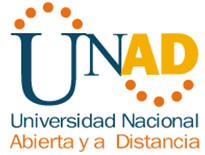
UNAD Nivel de Formación: Especialización Bogotá Colombia |
Especialización en Dirección Prospectiva y Estratégica de las Organizaciones Universitarias |
Registro Calificado 210256583381100112300 Nivel de Formación : Especialización Propósito de Formación : Facilitar la comprensión conceptual de los fundamentos que orientan la educación superior y sus posibles desarrollos, como un proceso participativo y reflexivo de construcción de visión que intenta mirar hacia el futuro de la ciencia, la tecnología y la sociedad para soportar la toma de decisiones del presente y movilizar fuerzas unidas para realizarlas. Título que conduce: Especialista en Dirección Prospectiva y Estratégica de las Organizaciones Universitarias Créditos Académicos: 25 Perfil Profesional : El Especialista en Dirección Prospectiva y Estratégica de las Organizaciones Universitarias estará en capacidad de: • -Comprender la dinámica de las organizaciones universitarias. • Conocer la naturaleza de la legislación educativa colombiana y su impacto sobre la dirección de instituciones de educación superior. • Visualizar el papel sociológico, económico y político de la Educación Superior en nuestro contexto sociográfico, frente a las tendencias y desarrollos en el contexto internacional. • Desarrollar amplios conocimientos sobre la naturaleza, instrumentos, procedimientos y fines de la evaluación con propósitos de calidad en educación superior. • Gerenciar procesos de planeación prospectiva y estratégica • Ejecutar, coordinar y evaluar la ejecución de proyectos de desarrollo organizacional planteados a partir de la planeación prospectiva. Perfil de Desempeño: El Especialista en Dirección Prospectiva y Estratégica de las Organizaciones Universitarias podrá desempeñarse en cargos de dirección, tales como: • Rector, Director de Centros Regionales de Educación a Distancia, Director de planificación y Director de Unidades académicas. Además podrá: • Ofrecer servicios de consultoría en: Planificación Prospectiva y Estratégica de las organizaciones del conocimiento; procesos de acreditación y autoevaluación; procesos de innovación y gestión flexible de la universidad; y diseño de estrategias e indicadores de competitividad del sector educativo. • Asesorar Entes Territoriales y Gubernamentales en la Formulación de Políticas Educativas y Puesta en Práctica de Planes de Desarrollo para el Sector. Plan de Estudios
|
www.unad.edu.co/escuelas/index.php?option=com_content&view=article&id=93%3Atlos-de-pregrado&catid=22%3Aprogramas-posgrado&Itemid=178&showall=1 | ||||||||||||||||||||||||||||||||||||||||||||||||||||||||||||||||||||||||||||||||||||||||||||||||||||||||||||||||||||||||||||||

RVOE: 983020 México |
Especialidad en prospectiva | 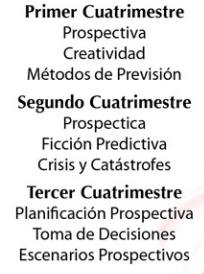 |
|||||||||||||||||||||||||||||||||||||||||||||||||||||||||||||||||||||||||||||||||||||||||||||||||||||||||||||||||||||||||||||||
| CGEE
Brasil |
|||||||||||||||||||||||||||||||||||||||||||||||||||||||||||||||||||||||||||||||||||||||||||||||||||||||||||||||||||||||||||||||||

Portugal |
Pós-Graduação em Prospectiva, Estratégia e Inovação |
|
|||||||||||||||||||||||||||||||||||||||||||||||||||||||||||||||||||||||||||||||||||||||||||||||||||||||||||||||||||||||||||||||

Universidad de Ciencias Empresariales y Sociales Buenos Aires Argentina |
Especialización en Prospectiva Estratégica |
|
|||||||||||||||||||||||||||||||||||||||||||||||||||||||||||||||||||||||||||||||||||||||||||||||||||||||||||||||||||||||||||||||
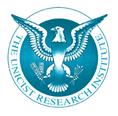
Universidad Unicista Argentina - USA |
Postgrado en Prospectiva |
Este postgrado está dirigido básicamente a quienes tienen la responsabilidad de desarrollar estrategias de negocios internacionales y necesitan prever el futuro de diferentes mercados para posicionar la empresa en función de coyunturas internacionales. |
|||||||||||||||||||||||||||||||||||||||||||||||||||||||||||||||||||||||||||||||||||||||||||||||||||||||||||||||||||||||||||||||

España |
Master en prospectiva, sistémica y modelación de sistemas socionaturales | El estudiante será siempre un elemento activo, protagonista del programa. La pluridisciplinariedad del programa tiene que venir de la mano, entre otras cosas, de la diversidad de formación de sus estudiantes y profesores, y de la confrontación dialéctica de las diferentes visiones que esta formación les da sobre el estado del mundo. Los lunes se desarrollarán una serie de actividades, conferencias, presentaciones, talleres de trabajo, que tienen como objetivo incrementar el tiempo y la calidad de la participación de los estudiantes del programa. | |||||||||||||||||||||||||||||||||||||||||||||||||||||||||||||||||||||||||||||||||||||||||||||||||||||||||||||||||||||||||||||||

USA |
Master Administration in Strategic Foresight |
WHAT THE CURRICULUM IN STRATEGIC FORESIGHT COVERS 1. Overview 2. Theory 3. Methods 4. Context 5. Capstone |
|||||||||||||||||||||||||||||||||||||||||||||||||||||||||||||||||||||||||||||||||||||||||||||||||||||||||||||||||||||||||||||||
| Universidad Católica de Santiago de Guayaquil
Ecuador |
Maestría en pensamiento estratégico y prospectiva para la educación superior |
Módulo I: Teoría de la educación superior, - Teoría de la universidad - Pensamiento estratégico Módulo II: Análisis prospectivo del entorno - Conceptualización de la prospectiva - Prospectiva estratégica - Geopolítica y geoestratégia - Tendencias mundiales de la educación superior - Perspectiva del Ecuador en América Latina: escenarios posibles - La sociedad del conocimiento Módulo III: Teoría y aplicación de la acreditación - Teoría y modelo de la autoevaluación institucional - La acreditación en las instituciones de educación superior del Ecuador - Taller de apropiación del proceso de acreditación a partir de casos reales Módulo IV: Teoría y aplicación del pensamiento estratégico - Direccionamiento estratégico - Ética y universidad Módulo V: Teoría y aplicación de la prospectiva - Modelo prospectivo estratégico I - Modelo prospectivo estratégico II - Nuevas tendencias de los estudios de fututo - La perspectiva tecnológica |
|||||||||||||||||||||||||||||||||||||||||||||||||||||||||||||||||||||||||||||||||||||||||||||||||||||||||||||||||||||||||||||||

USA |
Associate Arte Degree |
|
|||||||||||||||||||||||||||||||||||||||||||||||||||||||||||||||||||||||||||||||||||||||||||||||||||||||||||||||||||||||||||||||

|
International certified future stategist
UE program |
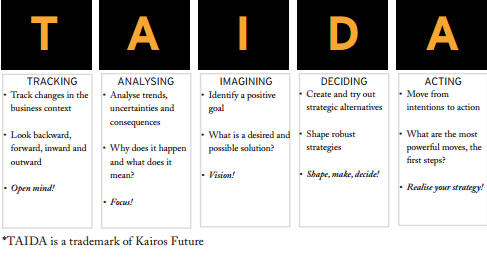 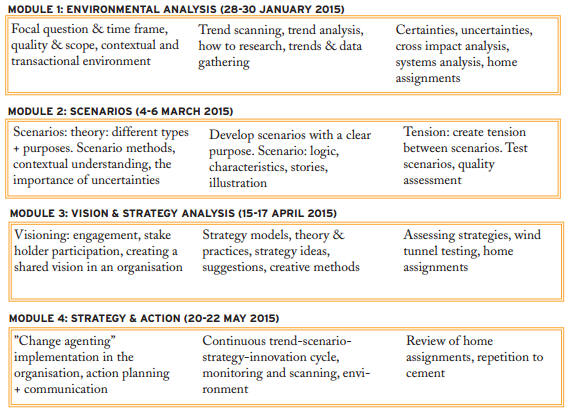 |
|||||||||||||||||||||||||||||||||||||||||||||||||||||||||||||||||||||||||||||||||||||||||||||||||||||||||||||||||||||||||||||||
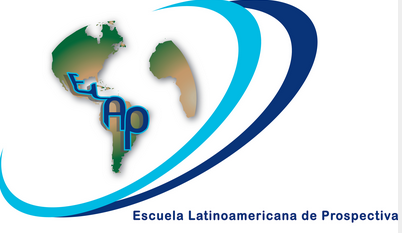 NO ACTIVO NO ACTIVO
|
|||||||||||||||||||||||||||||||||||||||||||||||||||||||||||||||||||||||||||||||||||||||||||||||||||||||||||||||||||||||||||||||||
Este sitio se realiza en primera instancia con intencionalidad investigativa, acerca del estado del arte en estudios de futuros, su uso en el proceso ha sido de carácter académico y formativo por parte de Lucio Mauricio Henao Vélez.
El estado del arte en estudios de futuros, descrito en este sitio es una recopilación y complementación elaborada por Lucio Mauricio Henao Vélez desde su experiencia, información secundaria indagada en sitios web de prospective, future studies, future research. foresight y otras fuentes.
|
|

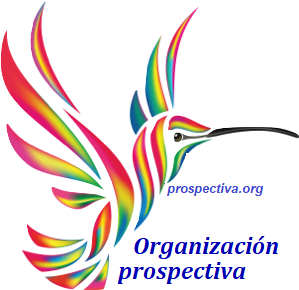
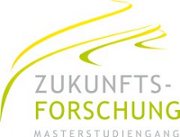

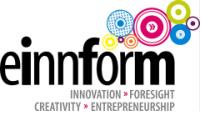
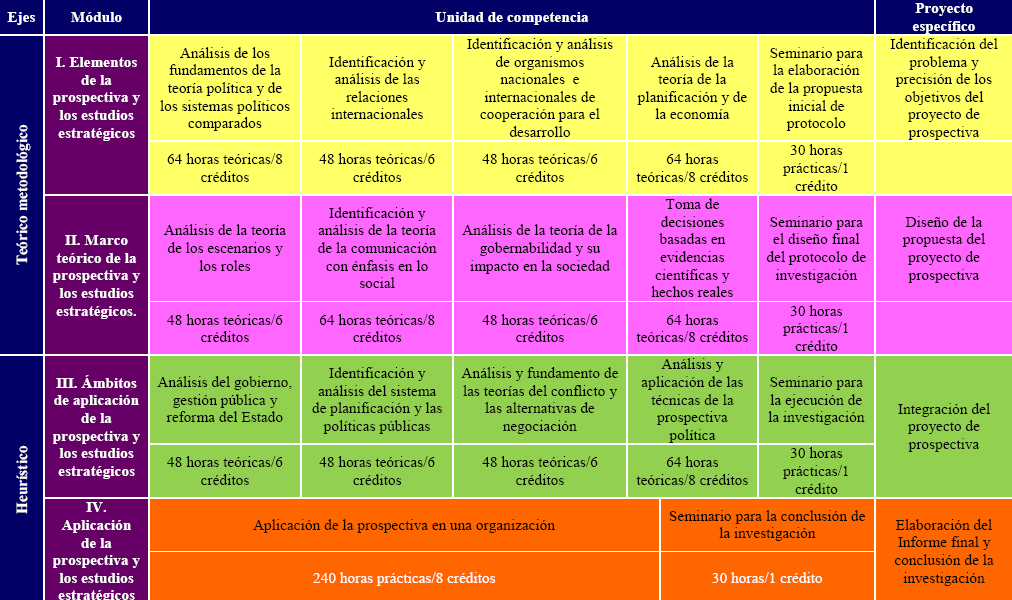
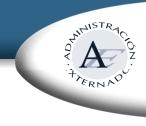
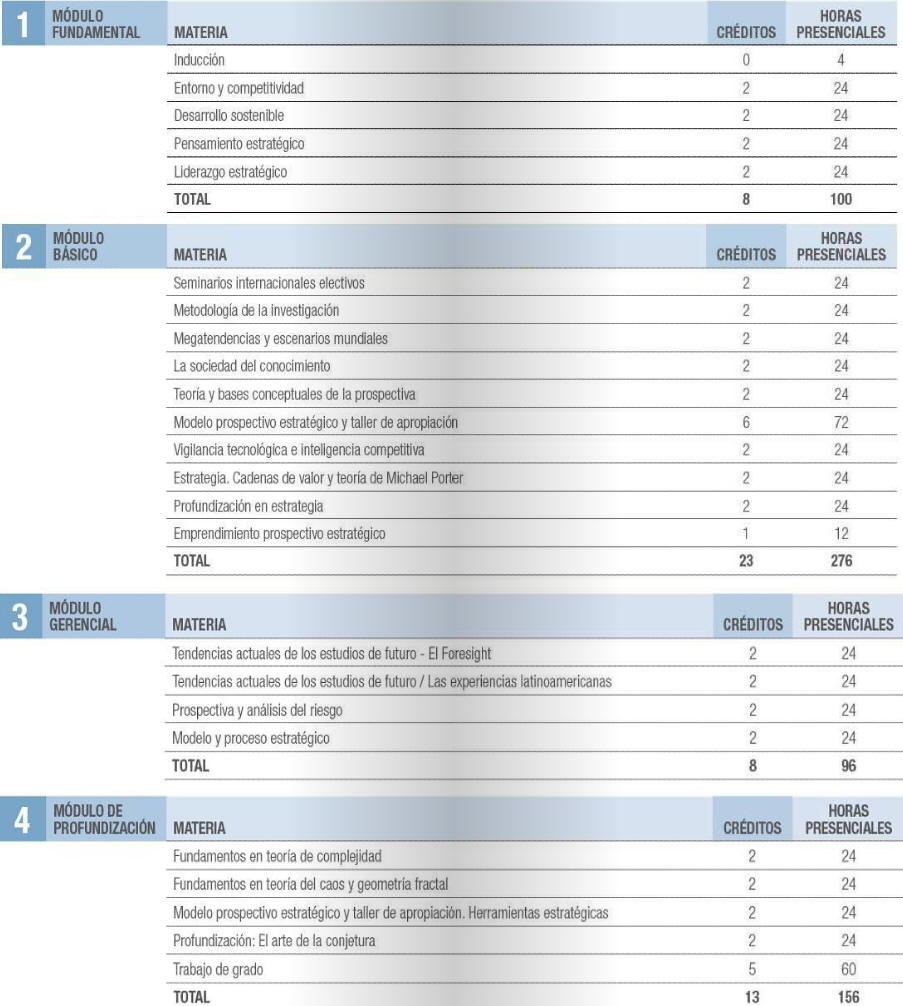
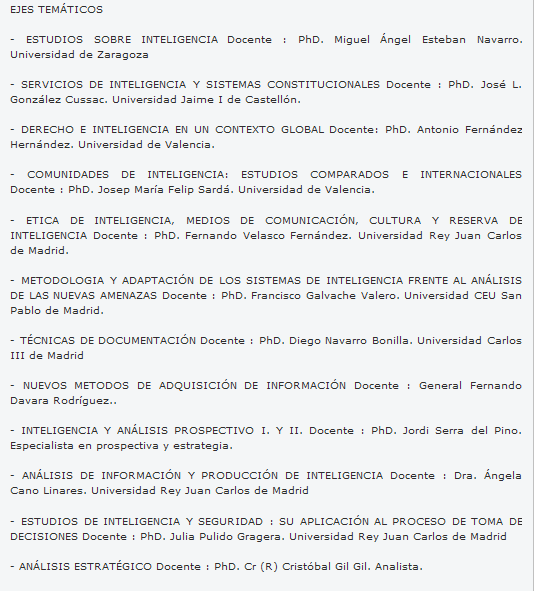
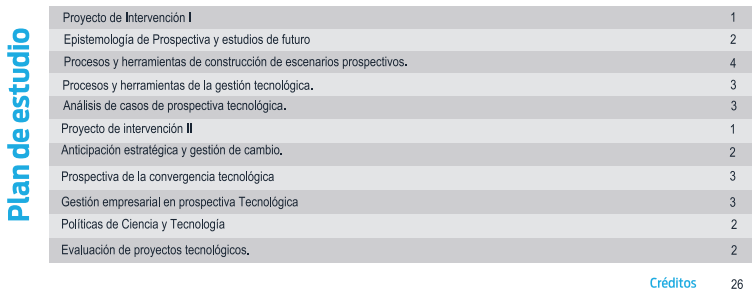
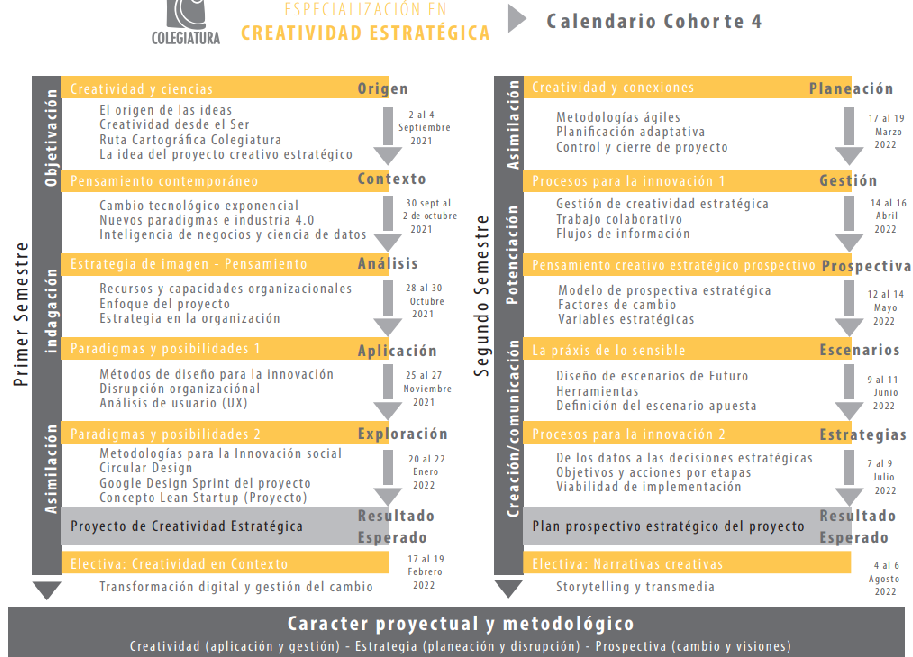
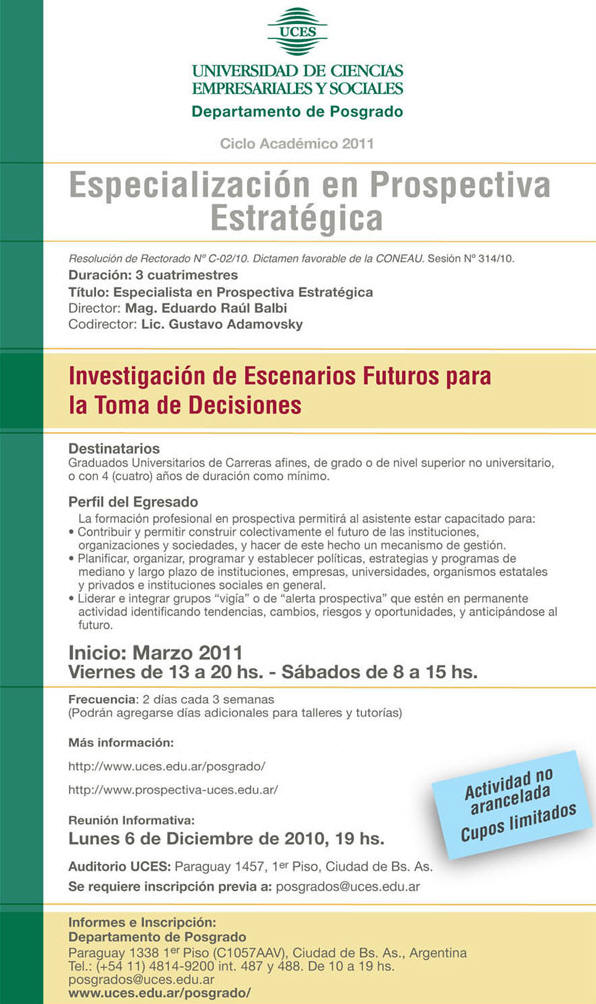
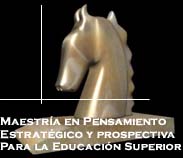
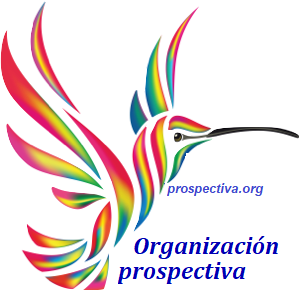 Organización Prospectiva
Organización Prospectiva